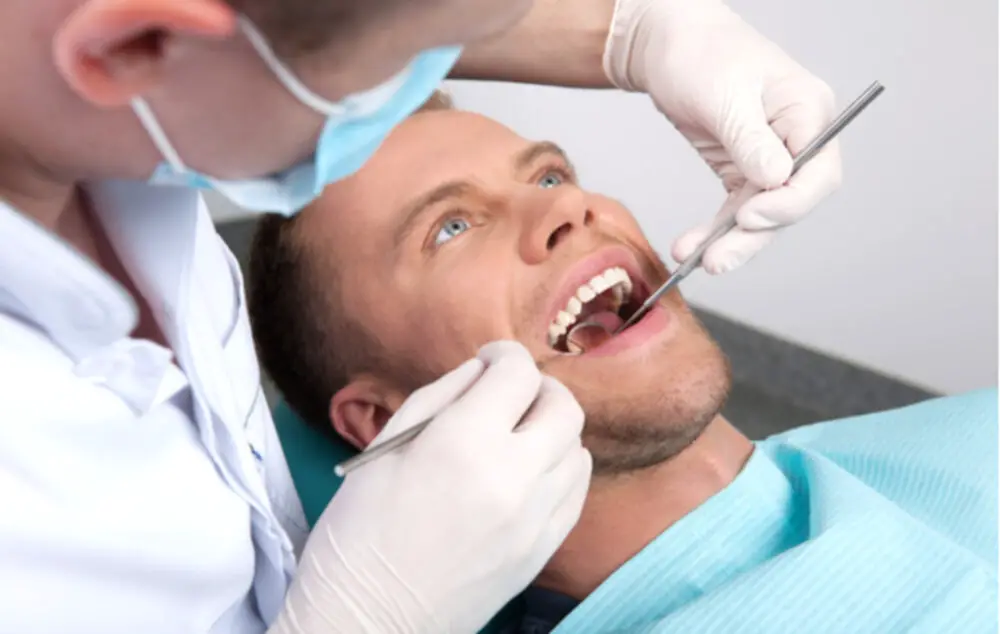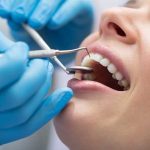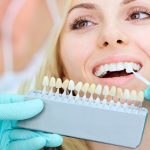Why Braces Make Your Teeth Feel Loose: Causes and Solutions

Orthodontic braces are a popular option for people who want to straighten their teeth and improve their overall dental health. However, braces can sometimes cause discomfort and make your teeth feel loose. This can be a cause for concern, but it is a common side effect of having braces. Understanding the causes and solutions of why braces make your teeth feel loose can help you feel more confident and comfortable during your orthodontic treatment. One of the main reasons why braces can make your teeth feel loose is because they are designed to move your teeth into a new position. This movement can cause your teeth to shift slightly, which can result in a feeling of looseness. Additionally, the braces themselves can put pressure on your teeth, which can also contribute to this sensation. While this feeling can be uncomfortable, it is a necessary part of the orthodontic process and is a sign that your braces are working as intended. In the following paragraphs, we will explore more about the causes of this sensation and the solutions to make you feel more comfortable.
Braces are orthodontic devices made of brackets, wires, and rubber bands that are attached to the teeth to correct malocclusion or misalignment of teeth and jaws. They are used to apply constant pressure on the teeth, which gradually moves them into the desired position. Braces can be used to fix a variety of dental issues, such as overcrowding, gaps between teeth, overbite, underbite, crossbite, and more. They are usually recommended during adolescence when the teeth and jaws are still growing, but they can also be used in adulthood. Braces can help improve the function and appearance of teeth, prevent dental problems, and enhance self-confidence. However, they can also cause some discomfort and make teeth feel loose, which is a common concern among patients undergoing orthodontic treatment.
During braces treatment, it is common for teeth to feel loose. This sensation occurs due to the movement of teeth. Braces exert pressure on teeth, which causes the bone to breakdown, allowing the teeth to shift and reposition. As teeth move, the periodontal ligament that holds them in place becomes stretched and compressed, leading to the feeling of looseness. Additionally, the braces themselves can cause some discomfort as they apply pressure to the teeth. While feeling loose may be concerning, it is a normal part of the braces process and usually resolves once treatment is complete. In some cases, orthodontic wax or pain medication can help alleviate discomfort.
Causes of Loose Teeth During Braces Treatment

Braces are a common orthodontic treatment that helps align crooked teeth and correct bite issues. However, during the treatment process, patients may experience loose teeth. This can be concerning, but it is a normal occurrence during braces treatment. One of the main causes of loose teeth during braces treatment is the shifting of teeth. As the braces apply pressure to move the teeth into the correct position, they may become loose temporarily. This is because the ligaments and bone surrounding the teeth need time to adjust to the new position. This can cause some discomfort, but it is a sign that the braces are doing their job. Another cause of loose teeth during braces treatment is the process of bone remodeling. As the teeth shift into their new position, the bone surrounding them will begin to break down and rebuild itself. This process can cause some discomfort and lead to temporary looseness in the teeth. However, once the bone has fully remodeled and stabilized around the teeth, they will become firmly rooted in their new position. It is important to follow proper oral hygiene practices during braces treatment to ensure that the teeth and gums remain healthy and strong throughout the process.
Braces are orthodontic devices used to straighten teeth and correct bite problems. They work by applying constant pressure on the teeth to gradually shift them into the desired position. The brackets are attached to the teeth, and a wire connects them. The wire is tightened regularly, which puts tension on the teeth and causes them to move. The braces also have elastic bands that help to hold the wire in place and further guide the teeth into the correct position. Over time, the bone surrounding the teeth adjusts to the new position, allowing the teeth to become permanently aligned. Although the process of moving teeth with braces can be uncomfortable, the end result is a beautiful, healthy smile.
During the orthodontic treatment, teeth may feel loose as they are being shifted and moved into their new positions. This is because braces apply gentle pressure on teeth, causing the bone around the teeth to break down and rebuild in a new location. As a result, teeth may feel wobbly and loose for a short period of time until they have adjusted to their new position. However, in some cases, teeth may become too loose and even fall out if the pressure is too intense or if the bone cannot keep up with the movement. Therefore, it is essential to follow your orthodontist’s instructions and attend regular check-ups to ensure that your teeth are moving as intended and that any potential issues are identified and addressed promptly.
Bone and gum tissue play a crucial role in tooth movement when it comes to orthodontic treatment. Braces exert pressure on the teeth, which causes the bone to break down and rebuild to accommodate the new position of the teeth. As the bone remodels, it allows the teeth to shift into the correct alignment. Gum tissue also plays a role in tooth movement by adapting to the new position of the teeth and providing support. However, excessive pressure on the gum tissue can cause discomfort or even damage, so it’s essential to follow the orthodontist’s instructions carefully. With proper care and supervision, bone and gum tissue can work together to help achieve a beautiful, healthy smile.
Solutions for Loose Teeth During Braces Treatment

Loose teeth during braces treatment can be a common concern, but there are several solutions to alleviate the discomfort and ensure the teeth remain healthy and strong. One solution is to practice good oral hygiene habits, such as regularly brushing and flossing teeth, to prevent gum disease and tooth decay that can weaken tooth support. Additionally, avoiding hard or sticky foods that can damage braces or teeth, and using a mouthguard during physical activity can prevent further looseness or damage to teeth. Patients can also consider using orthodontic wax to cushion and protect the braces and surrounding teeth, reducing soreness and discomfort. Another effective solution for loose teeth during braces treatment is to visit the orthodontist regularly for check-ups and adjustments. Orthodontists can monitor the progress of the treatment and make necessary adjustments to ensure the teeth are moving in the right direction and at the right pace. They can also provide additional tools, such as elastic bands or other appliances, to help stabilize loose teeth and provide additional support. Finally, patients can consider using an over-the-counter pain reliever to alleviate any discomfort or swelling that may occur during the treatment process. By following these solutions, patients can ensure their teeth remain strong and healthy, even during the braces treatment process.
When undergoing orthodontic treatment, it is common to experience discomfort due to the shifting of the teeth. Loose teeth can make eating and speaking difficult, and can cause anxiety for patients. Fortunately, there are several ways to alleviate this discomfort. One solution is to consume soft foods that require minimal chewing, such as yogurt, soup, and mashed potatoes. Another option is to use over-the-counter pain relievers, such as ibuprofen or acetaminophen, to reduce swelling and alleviate pain. Additionally, patients can use orthodontic wax to cover any brackets or wires that are causing irritation. Finally, maintaining good oral hygiene by brushing and flossing regularly can prevent gum inflammation and further discomfort. By following these strategies, patients can manage the discomfort caused by loose teeth and stay on track to achieving a beautiful, healthy smile.
Caring for your teeth and braces is essential to minimize looseness and prevent any damage to your orthodontic appliances. Firstly, it is crucial to maintain a proper oral hygiene routine, which includes brushing twice a day, flossing daily, and using a mouthwash to kill any bacteria or debris that might accumulate in your braces. Additionally, patients should avoid sticky or hard food items that could damage their braces, such as hard candy or chewing gum. It is also recommended to wear a mouthguard while playing sports or engaging in any physical activity that could cause trauma to your teeth. Finally, regular dental check-ups and appointments with your orthodontist are essential to ensure that your braces stay in good condition and that your teeth remain healthy and aligned. By following these tips, you can minimize looseness in your teeth and ensure that your braces treatment proceeds smoothly.
If you are experiencing loose teeth, it is important to contact an orthodontist for help as soon as possible. Loose teeth can be a sign of various dental problems, such as gum disease or misaligned teeth, which can lead to further damage if left untreated. An orthodontist can evaluate your teeth and recommend the best treatment plan for your specific needs. This may include braces or other orthodontic appliances to correct the underlying issue and prevent further damage. It is important to address loose teeth promptly to ensure the best possible outcome for your dental health.
Potential Complications of Loose Teeth During Braces Treatment

Loose teeth during braces treatment can be a cause of concern for many individuals. While it is a normal and expected part of the orthodontic process, there are potential complications that can arise if left untreated. One of the most common complications is gum recession, which occurs when the gums pull away from the teeth and expose the roots. This can lead to sensitivity, pain, and even tooth loss if left untreated. To prevent gum recession, it is important to maintain good oral hygiene habits such as brushing twice a day, flossing regularly, and using mouthwash. Another potential complication of loose teeth during braces treatment is tooth mobility. This occurs when the ligaments and tissues that hold the teeth in place are stretched and weakened, causing the teeth to move excessively. If left untreated, tooth mobility can lead to bite problems, jaw pain, and even tooth loss. To prevent tooth mobility, it is important to follow the orthodontist’s instructions carefully and avoid chewing on hard or sticky foods. Additionally, wearing a mouthguard can help protect the teeth and prevent further damage. By being aware of these potential complications and taking steps to prevent them, individuals can ensure a successful and healthy orthodontic treatment.
Untreated loose teeth during orthodontic treatment can lead to several potential complications that can impact the overall success of the treatment. Firstly, loose teeth can move unpredictably, causing misalignment of the teeth and jeopardizing the effectiveness of the braces. Secondly, untreated loose teeth can cause discomfort and pain, making it difficult for the patient to eat and speak normally. Additionally, untreated loose teeth can also lead to gum recession and bone loss, which can affect the long-term health of the teeth and gums. Therefore, it is important for patients to address any loose teeth immediately with their orthodontist to ensure the success of their treatment and maintain their overall dental health.
Preventing complications from braces requires a multifaceted approach. First, it is essential to maintain good oral hygiene habits, including brushing and flossing regularly. This helps to prevent tooth decay and gum disease, which can lead to tooth loss and other complications. Second, it is important to follow the orthodontist’s instructions for wearing braces, including wearing rubber bands and headgear as directed. This helps to ensure that the teeth are moved safely and effectively. Finally, it is important to avoid foods that can damage the braces or the teeth, such as hard or sticky candies and popcorn. By following these steps, patients can reduce the risk of complications and achieve a beautiful, healthy smile.
During braces treatment, it is a common experience to feel like your teeth are loose. This is because braces apply pressure to the teeth that can cause them to move, which is necessary for straightening them out. However, if your teeth feel excessively loose, it could be due to various causes such as biting hard foods, poor oral hygiene, or even genetics. To prevent loose teeth, it is important to practice good oral hygiene habits and avoid hard, sticky foods that can damage the braces or teeth. Additionally, wearing a mouthguard while playing sports can help protect the teeth from injury. If you do experience loose teeth during braces treatment, don’t panic. This is a normal part of the process, and your orthodontist will monitor your progress and adjust your treatment accordingly.
It is crucial to follow proper care instructions when wearing braces as they require extra attention and care to maintain oral health. Neglecting to follow instructions can cause various issues, including loose teeth, gum disease, and even tooth decay. Seeking professional help for any problems or concerns is also crucial, as a dentist or orthodontist can provide proper guidance and advice to ensure that the braces are functioning correctly and that the teeth and gums remain healthy. By following care instructions and seeking professional help when necessary, individuals can ensure that they have a healthy and beautiful smile after their braces are removed.
Conclusion

In conclusion, braces are an effective orthodontic tool for correcting misaligned teeth, but they can sometimes make your teeth feel loose. This is due to the pressure exerted by the braces on your teeth, which causes them to shift and reposition. However, this sensation is typically temporary and can be managed with proper care and attention. Some solutions to alleviate this discomfort include eating soft foods, avoiding sticky and hard foods, and maintaining good oral hygiene. It’s important to follow your orthodontist’s instructions and attend regular check-ups to ensure that your treatment is progressing as planned. Overall, while the feeling of loose teeth may be unsettling, it’s a normal part of the orthodontic process and a small price to pay for achieving a beautiful, healthy smile.







